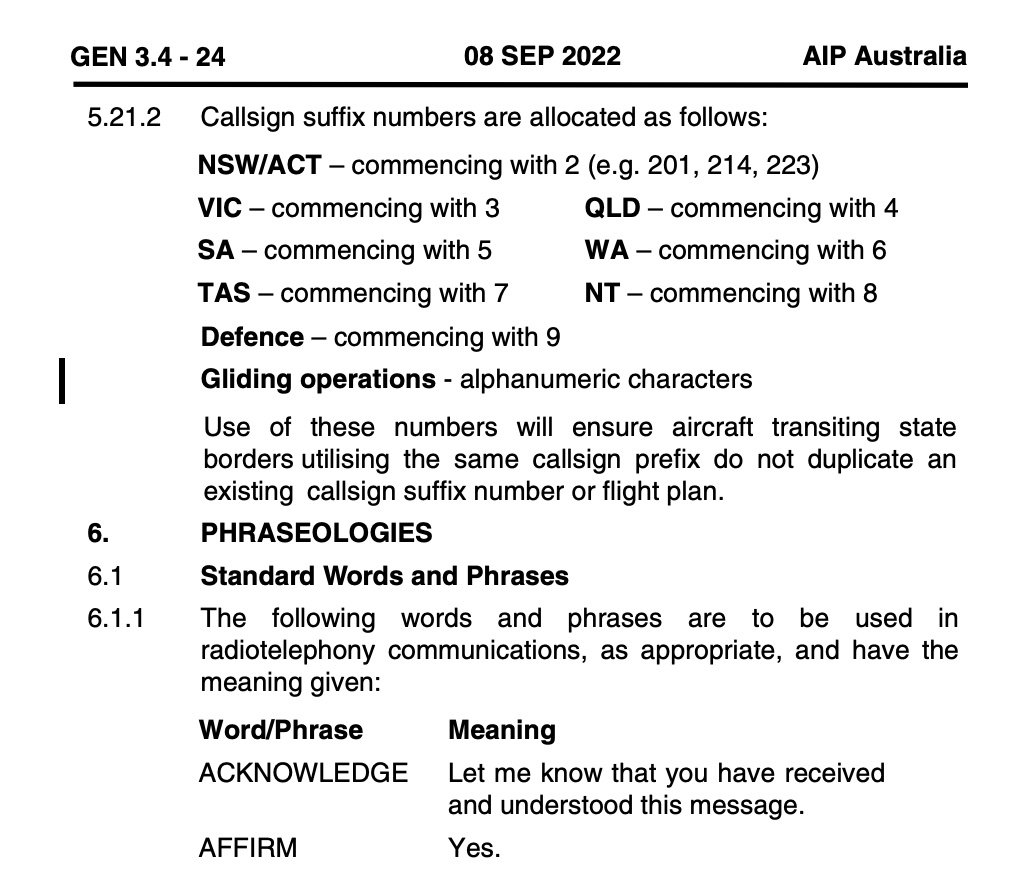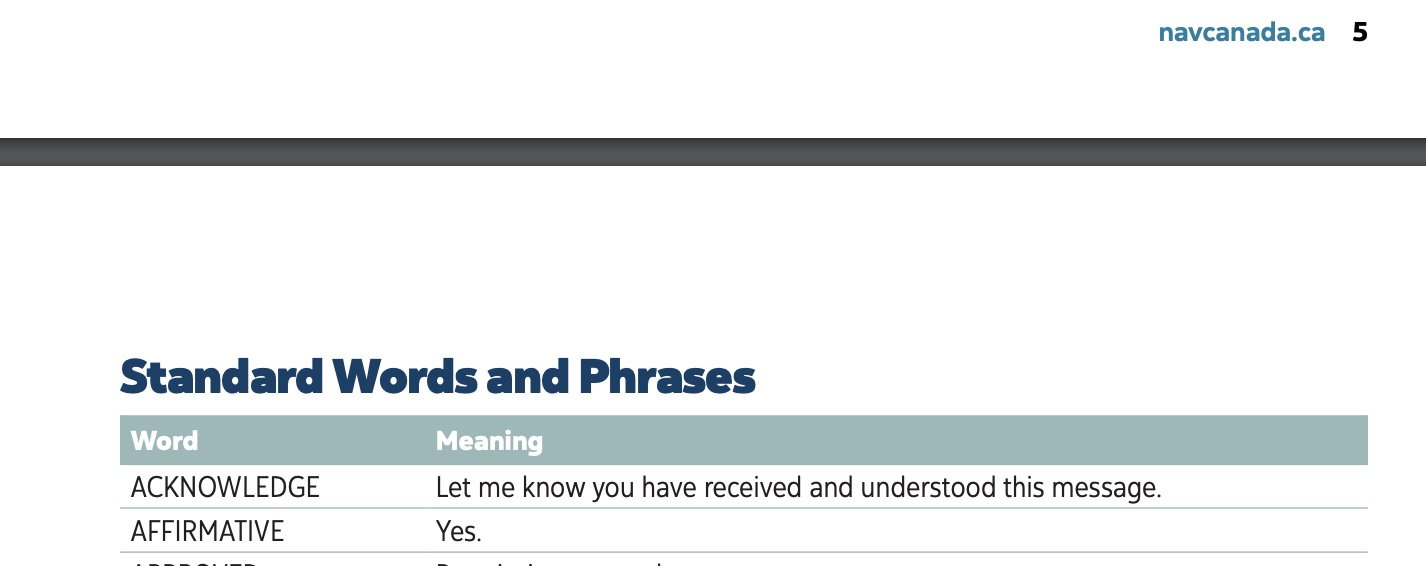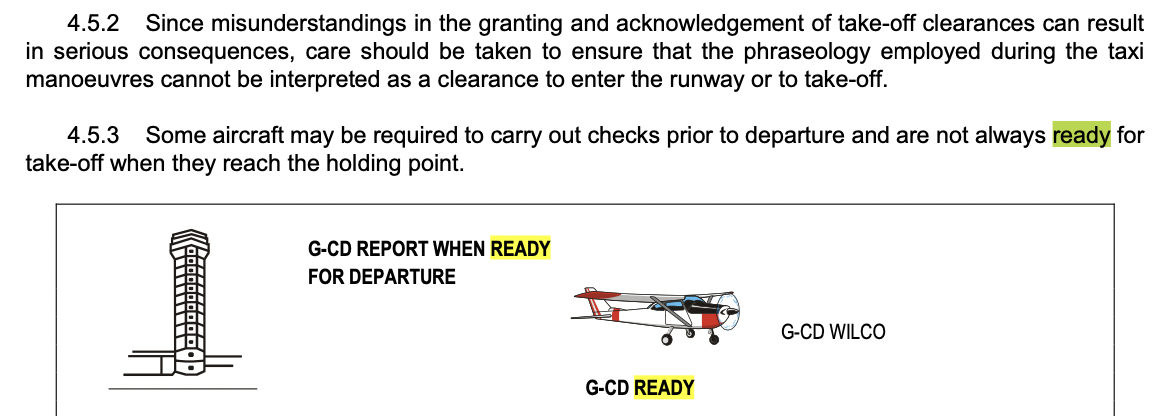Radio/ATC etiquette and professionalism
One of my personal favourites was when a German pilot was requesting an airways clearance on the ground in German. The German controller came back with "in English please" the pilot replied in English with "I am German, in a German aircraft in Germany, why would I speak English". A voice in breaks into the conversation and says, " because ya lost the war mate"
Well technically you're both wrong. "Guard" is a function not a frequency. The frequency to which you're probably referring is known as the International Distress Frequency, Aircraft Emergency Frequency, and so on. Only in slang is 121.5 known as "guard" which you'd be interested to know as this thread is about precision and clarity and the avoidance of slang. The term has become bastardised over the years to its current form.
"Guard" is a function of some transceivers wherein the set has transceiver capability ("Manual") on one frequency and also receiver-only ("Guard") on a second frequency, generally intended to be an emergency frequency such as 121.5 or 243.0. This second frequency is "guarded" in case someone is in distress and transmitting on it and the function is called Guard.
Here's an old set with a guard selection:

"Guard" is a function of some transceivers wherein the set has transceiver capability ("Manual") on one frequency and also receiver-only ("Guard") on a second frequency, generally intended to be an emergency frequency such as 121.5 or 243.0. This second frequency is "guarded" in case someone is in distress and transmitting on it and the function is called Guard.
Here's an old set with a guard selection:

The following users liked this post:
Yes: The guard 'function' allowed you to monitor the guard frequency while transmitting and receiving on a different frequency. Just note that when the controller of the system you posted was set to the 'GUARD' position, the system transmitted and received only one frequency: 243MHz.
This is where people from English-speaking countries would say: "I couldn't care less", because the rules about aviation air-to-air- phraseology turn out to be what they happen to be from time to time and we'll all just get on with complying with them.
But in the good ol' USA, I'm apparently supposed to say: "I could care less", in order to convey my intention that I couldn't care less. Go figure.
But in the good ol' USA, I'm apparently supposed to say: "I could care less", in order to convey my intention that I couldn't care less. Go figure.
Yes: The guard 'function' allowed you to monitor the guard frequency while transmitting and receiving on a different frequency. Just note that when the controller of the system you posted was set to 'guard', the system transmitted and received only one frequency: 243MHz.
Yeah nah. Americans don't 'do' sarcasm very well. I subscribe to these theories.
The guard 'function' to which you referred is the consequence of a separate, dedicated receiver tuned to the distress frequency. For example, the transceiver in the system which includes the controller of which you posted a picture - the AN/ARC164 - there is a separate, dedicated receiver tuned to 243MHz. You will hear transmissions on 243MHz in that system, irrespective of whether the function switch is set to "MANUAL" or "PRESET" or "GUARD". That separate receiver is 'guarding' the distress frequency, full time. Switching that controller to "GUARD" means the 'main' transceiver will then transmit and receive on 243MHz.
"Guard" is a function not a frequency
The 'Ready' call is just "Ready". Otherwise what else would you be ready for.
This is why we have ICAO standard phraseologies. To avoid local colloquialisms.
The following users liked this post:
I think that the USA was one of the primary initiators of everything ICAO. Isn't it called the Chicago Convention?
This is an amusing tale about the misuse of "Guard". Scarcely believable.
Chatter on Guard
I think flying the North Atlantic prior to FANS and RVSM sharpened my R/T. Flew with many nationalities and cockpit personalities and our calls to Shanwick, Gander, New York had to be timely and precise. Most airlines provided detailed instructions and I think the position report was the same structure as the page 2 on the FMS.
These days I am taken back by the basic misunderstanding of many supposed level 6 English speakers ( mostly ex military Commanders who have promoted rapidly from domestic operations without international experience ). Failing to climb/descend to a level before crossing a Longitude when requested is often excused as confusing English. WTF
These issues are not fixed in simulators and flight operations debriefings. They try to get about the problem with SOP's like not accepting clearances without 2 people on flight deck or rostering special F/O's to take care of the radio.
Anyway I am rambling. While I am all for flexible R/T ( time and place), polite, clear and correct R/T makes me feel safer in the air.
These days I am taken back by the basic misunderstanding of many supposed level 6 English speakers ( mostly ex military Commanders who have promoted rapidly from domestic operations without international experience ). Failing to climb/descend to a level before crossing a Longitude when requested is often excused as confusing English. WTF
These issues are not fixed in simulators and flight operations debriefings. They try to get about the problem with SOP's like not accepting clearances without 2 people on flight deck or rostering special F/O's to take care of the radio.
Anyway I am rambling. While I am all for flexible R/T ( time and place), polite, clear and correct R/T makes me feel safer in the air.
The following 3 users liked this post by Fluke:
To be picky ….. Ready for take-off also went out of the window many years ago and was replaced with “Ready for departure”. That way, the information call could not be confused with a take-off clearance.
Mog
Mog

I wouldn't classify it as "pretty bad RT" - it's understandable and in some parts of the world - mine for example
 - it's standard:
- it's standard:
Does anyone know why "AFFIRM" was adopted in some countries? Was it possibly to avoid confusing "AFFIRMATIVE" with "NEGATIVE"?
I must say I always find this response amusing: "Yes, affirmative."
Join Date: Oct 2001
Location: Starring at an Airfield Near you
Posts: 371
Received 15 Likes
on
7 Posts
Back in the good ol’ days, there was discipline around correct pronunciation as well as the correct terminology. Both contribute to clarity and, therefore, safety.
A topical example: The correct pronunciation of “affirm” in aeronautical comms is AY-firm, not afferrm, with emphasis on the “AY”. (We would have kept AY-firmative if we’d maintained discipline of pronunciation.)
A topical example: The correct pronunciation of “affirm” in aeronautical comms is AY-firm, not afferrm, with emphasis on the “AY”. (We would have kept AY-firmative if we’d maintained discipline of pronunciation.)
The following users liked this post:
They try to get about the problem with SOP's like not accepting clearances without 2 people on flight deck or rostering special F/O's to take care of the radio.
As for more accomplished speaking FOs and the such, it happens, however crews on international flights now have captains that were those FOs and so on, so it's far less of an issue. They still speak local lingo when in country at non international ports, so when outside the country they just need somebody who can reliably speak on the radio and translate.
As for modern radio phraseology, it's more like a Victorian era English teacher has taken over writing and it's waffle that adds nothing to safety. "ABC Line-up behind the Blah-Blah-Blah-Blah-Blah-Blaaaaah Airlines Boeing 747 Behind and wait, number two to a BLah-Blah-BLAH-BLAAAH Airlines 737 departing on the crossing runway" No mention of runway you are cleared to enter or such, giving overly descriptive terms for traffic at night, so that a similar callsign on the other runway reads back at the same time and you both line up. By the time you sort out the radio mess with further long winded waffle you've missed several arrival and departure slots.
Why do I have to say "climbing TO" or "descending TO". I mean its just unwarranted waffle. If you want to achieve better radio efficiency stick to the main words, it's not a Shakespeare recital. I would have the call as just "ABC Climb Level 320" - "Climbing Level 220 ABC". Even adding "flight" is really not required, it adds no more clarity and lengthens the call.
Last edited by 43Inches; 13th Aug 2023 at 23:39.
The following users liked this post:
Why do I have to say "climbing TO" or "descending TO". I mean its just unwarranted waffle. If you want to achieve better radio efficiency stick to the main words, it's not a Shakespeare recital. I would have the call as just "ABC Climb Level 320" - "Climbing Level 220 ABC". Even adding "flight" is really not required, it adds no more clarity and lengthens the call.
I can't say I've ever heard anyone without an examiner sitting alongside say "climbing TO" or "descending TO" (and suggest it's a great way to inform ATC you're under instruction without actually saying so!
 ). Many calls abbreviated in practice, including "..passing 6000, climbing 8000" and "..base 03 full stop" still convey significant meaning on a busy frequency without perhaps being as precise as the AIP would like.
). Many calls abbreviated in practice, including "..passing 6000, climbing 8000" and "..base 03 full stop" still convey significant meaning on a busy frequency without perhaps being as precise as the AIP would like.
The following users liked this post:
I presume you hate it because it is not the correct terminology in your part of the world:

I wouldn't classify it as "pretty bad RT" - it's understandable and in some parts of the world - mine for example - it's standard:
- it's standard:

Does anyone know why "AFFIRM" was adopted in some countries? Was it possibly to avoid confusing "AFFIRMATIVE" with "NEGATIVE"?
I must say I always find this response amusing: "Yes, affirmative."

I wouldn't classify it as "pretty bad RT" - it's understandable and in some parts of the world - mine for example
 - it's standard:
- it's standard:
Does anyone know why "AFFIRM" was adopted in some countries? Was it possibly to avoid confusing "AFFIRMATIVE" with "NEGATIVE"?
I must say I always find this response amusing: "Yes, affirmative."





 clipped "...ative" reply.
clipped "...ative" reply.
